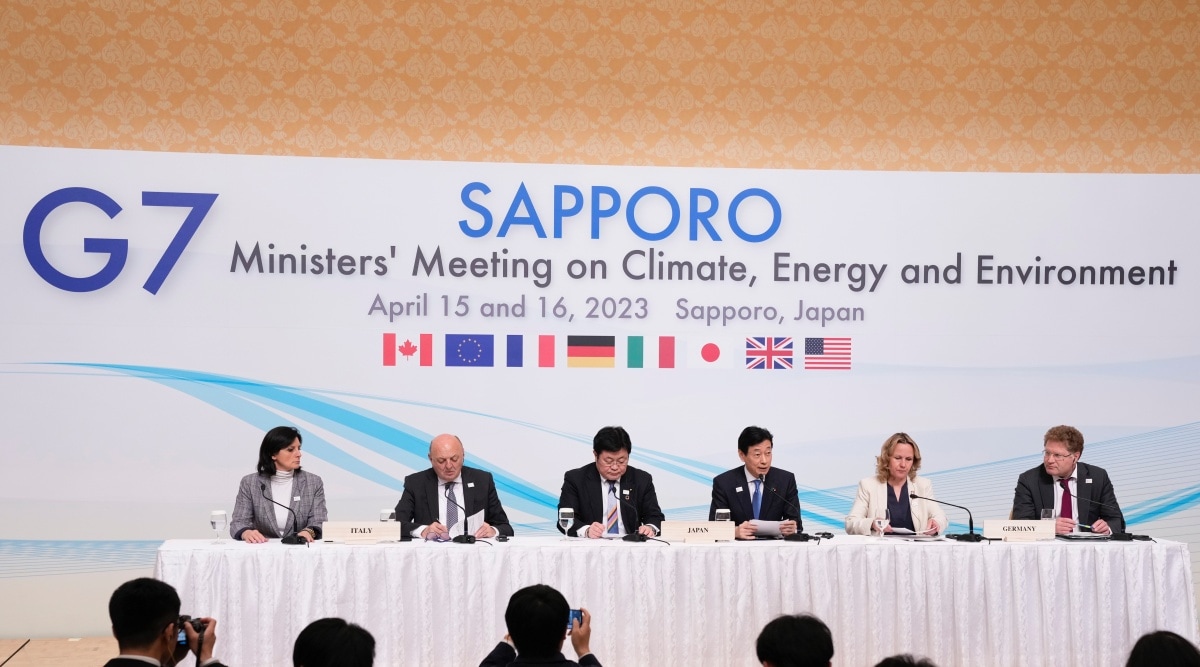G7 Climate and Environment Ministers’ meet concludes, states commit to decarbonise power grids by 2035
The G7 meeting in Japan condemned Russia’s “illegal unjustifiable, and unprovoked war of aggression against Ukraine”, its violation of the UN Charter and disregard to the impact of its war "on people worldwide.”
 The group failed to say how it will increase its efforts to assist other countries scale up their energy transition and energy efficiency. (AP)
The group failed to say how it will increase its efforts to assist other countries scale up their energy transition and energy efficiency. (AP) At the conclusion of the G7 Climate and Environment Ministers’ meeting in Sapporo, Japan on Sunday, the G7 countries committed to decarbonise their power grids no later than 2035 and accelerate the phase-out of “domestic unabated coal power”. The G7 states further stated that there is an urgent need to reduce greenhouse gas emissions by around 43 per cent by 2030 and 60 per cent by 2035, aligned to 1.5 degrees in light of the most recent report by the Intergovernmental Panel on Climate Change (IPCC).
The G7 states have further committed to substantially increase the pace and scale of deployment of renewables, cut demand for gas as a primary response to the energy crisis and massively expand solar and offshore wind. In this boost to renewables, the G7 climate and environment ministers agreed to a breakthrough acceleration in solar and wind energy, collectively increasing offshore wind capacity of 150 GW by 2030 and solar PV to more than 1TW by 2030 and the increasing deprioritization of gas, coal and fossil fuels in a bid to limit global temperature rise to 1.5 degrees.
However, the group failed to say how it will increase its efforts to assist other countries scale up their energy transition and energy efficiency.
But while the G7 committed to decarbonising their power sector by 2035, they failed to agree to a proposal made by the UK and Canada to phase out coal by 2030. This proposal saw objections from Japan, the US and the European Union. Instead, the ministers agreed that there should be no further need for coal power stations either within the G7 or globally. The caveat is seen as a direct result of Japan’s failure to adopt more ambitious domestic power sector decarbonisation plans.
Japan’s attempt to promote ammonia co-firing as a form of clean technology in the power sector domestically and in Asia via the Asia Zero Emission Community (AZEC) was degraded by the rest of the group.
In a shift from last year, new gas investments have been downgraded from a “necessity” to a possibility that “can” help address potential shortfalls provoked however “in a manner consistent with our climate objectives and without creating lock-in effects”.
Condemning Russia’s attempts at ‘geopolitical coercion’
In its communiqué, the G7 has condemned Russia’s “illegal unjustifiable, and unprovoked war of aggression against Ukraine, violation of the Charter of the United Nations (UN) and disregard to the impacts that its war is having on people worldwide’’.
“We condemn Russia’s attempts to use energy and food as tools of geopolitical coercion and reiterate our commitment to supporting those most affected by Russia’s weaponisation of energy and food. We are deeply concerned about the devastating impacts of Russia’s war of aggression against Ukraine including on the environment, provoking an unprecedented global energy crisis characterised by high-energy prices, market volatility and disruptions to energy supply; inflation causing real economic impacts on people’s lives; a spike in the world’s grain and fertiliser prices which increased food insecurity and malnutrition,” it has said.
Unprecedented triple global crisis
The G7 has said that we are facing an “unprecedented triple global crisis of climate change, biodiversity loss and pollution that are mutually reinforcing and intrinsically linked, as well as an ongoing global energy crisis of unprecedented scale which has worsened economic and social disruptions, health threats and environmental damage”.
“To address these challenges through multilateral cooperation, we are steadfast in our commitment to the Paris Agreement, keeping a limit of 1.5°C global temperature rise within reach through scaled up action in this critical decade, and to the full, swift and effective implementation of the historic Kunming-Montreal Global Biodiversity Framework (GBF) adopted at the 15th Conference of the Parties to the Convention on Biological Diversity (CBD-COP15) with its mission to halt and reverse biodiversity loss by 2030, and welcome the landmark international legally binding instrument on the conservation and sustainable use of marine biological diversity of areas beyond national jurisdiction (BBNJ),’’ it said in its communiqué.
- 01
- 02
- 03
- 04
- 05






























